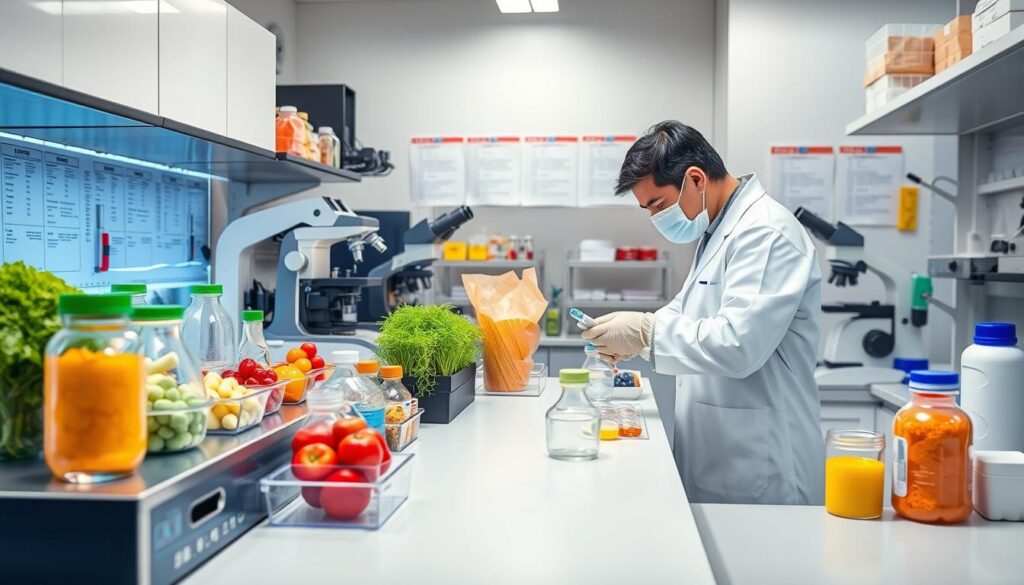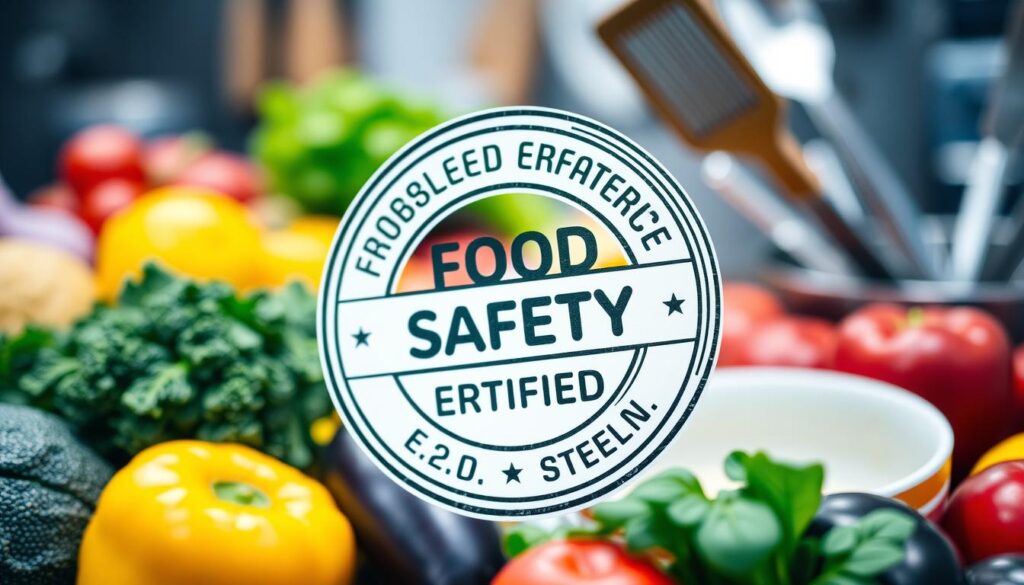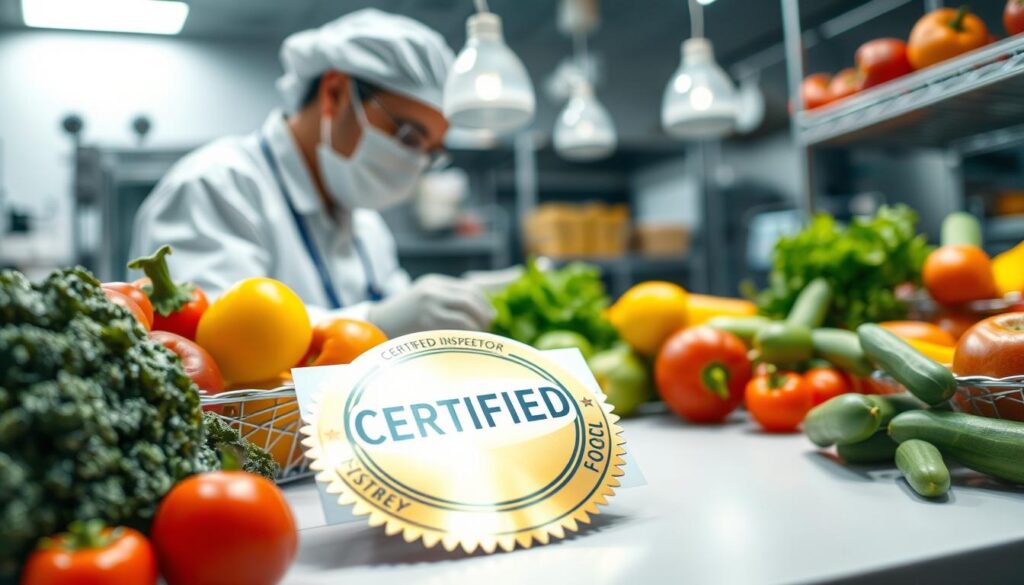In today’s food industry, trust from consumers is key. Ensuring our products are safe and of high quality is more important than ever. But what does it take for US companies to meet these complex food safety certification requirements? Let’s dive into the essential standards, regulatory bodies, and compliance steps that protect our food supply.
Are you sure the food on your shelves is safe and of high quality? Find out the surprising facts that could change how you handle food safety certification for your business.
Key Takeaways
- Understand the critical role of food safety certification in protecting consumer safety and building brand trust.
- Uncover the differences between federal and state-level food safety regulations and their impact on your business.
- Explore the key regulatory bodies responsible for overseeing food certification in the US and their specific mandates.
- Discover the essential steps to achieve and maintain compliance, including critical deadlines and renewal processes.
- Gain insights into the latest trends and technologies shaping the future of food safety monitoring and certification.
Understanding Food Safety Certification Requirements
Getting food safety certification can be tough for businesses. But it’s key to ensure your products are top-notch. Let’s look at the main differences between federal and state rules, and who you need to work with.
Federal vs. State Certification Guidelines
Food safety certification isn’t one-size-fits-all. Federal rules, like those from the FDA, set basic standards for all. But states might have extra rules you must follow. So, it’s important to check your area’s specific laws.
Key Regulatory Bodies and Their Roles
- The FDA: Oversees food safety and labeling, including the Food Safety Modernization Act (FSMA).
- The United States Department of Agriculture (USDA): Handles meat, poultry, and egg products.
- State and Local Health Departments: Enforce local food safety rules, often stricter than federal ones.
Compliance Deadlines and Renewal Processes
Keeping up with food safety certifications is a big job. There are strict deadlines and renewal rules. The details depend on your certifications. Missing these deadlines can lead to fines and losing your certification. So, plan well and make sure you have the right resources.
| Certification | Compliance Deadline | Renewal Frequency |
|---|---|---|
| FSMA (Food Safety Modernization Act) | Varies based on business size and food type | Annual |
| USDA Organic | N/A | Annual |
| State Food Safety Regulations | Varies by state | Varies by state |

Maintaining food safety certification is not just a regulatory requirement – it’s a crucial investment in the long-term success and reputation of your business.
Food Certification: Essential Steps for Business Compliance
Starting a business can be tough, especially with food certification. But don’t worry, we’re here to help. We’ll guide you through the key steps to follow. This includes non-GMO labeling and other certifications.
First, you need to check your current operations. Look at your ingredients, where you get them, and how you make your products. This helps you see what certifications you need.
- Learn about different food certifications. Look into organic, kosher, and halal, and see which fit your business.
- Make a plan for compliance. List the steps, timelines, and resources you need to meet the standards.
- Change your operations if needed. Update your procedures, find new ingredients, or change your labels.
- Apply for your chosen certification. Follow the application process and provide all needed documents.
- Keep up with compliance. Regularly check and update your processes to stay certified.
Non-GMO labeling is a great choice for health-conscious customers. It shows your products don’t have genetically modified organisms. This can make your products stand out.
“Getting the right food certification can change your business. It builds trust, attracts customers, and makes you stand out.”
Getting food certification might seem hard, but with the right help, you can do it. Let’s make sure your business is compliant and benefits from being certified.

HACCP Implementation and Documentation
HACCP (Hazard Analysis and Critical Control Points) is key for food safety. It ensures top standards are met. We’ll help you understand HACCP, so you can protect your customers and show your commitment to sustainable farming.
Critical Control Points Identification
The first step is to find the critical control points in your food making process. These are the steps where hazards like bacteria or chemicals can be stopped or lowered. By knowing these points, you can focus on keeping your food safe.
Monitoring Procedures and Record Keeping
Good HACCP needs careful watching and keeping records. We’ll show you how to track important steps, like checking temperatures and doing audits. Keeping good records helps you follow food safety rules and improve your farming.
Corrective Action Protocols
If HACCP rules are broken, you need a plan to fix it. We’ll teach you how to make plans for fixing problems, like recalling products or training staff. Being quick to act helps keep your customers happy and loyal.
Using HACCP shows you care about food safety standards and sustainable farming practices. It helps protect your customers and makes your business a leader in the field.
Organic and Non-GMO Certification Pathways
In today’s world, organic and non-GMO foods are big hits with health-focused shoppers. But, figuring out the certification world can be tough. Don’t worry! We’re here to help you understand the key differences and similarities between organic and non-GMO labels. This way, you can make smart choices for your business and your customers.
The USDA oversees organic certification, setting high standards for organic farming and labeling. To get the USDA Organic seal, companies must pass a detailed inspection. This ensures their products are free from harmful chemicals and GMOs.
- Organic farming follows strict practices like crop rotation and natural pest control.
- Companies must source ingredients carefully to meet USDA organic standards.
- Organic certification is renewed every year with regular checks to keep standards high.
Non-GMO labeling, however, is optional and run by groups like the Non-GMO Project. To get this label, companies must prove their products don’t have GMOs. This helps reassure shoppers who are watching their health.
- Non-GMO certification means thorough testing to confirm no GMOs are present.
- Companies must check their products and supply chains to keep their non-GMO status.
- Non-GMO labels are checked regularly to ensure they stay true to their promise.
Whether you’re aiming for organic or non-GMO, knowing your stuff is key. Plan well and work with the right authorities. For easier navigation, try the Food Scan Genius app. It can guide you through the certification maze and help pick the best path for your business.
“Organic and non-GMO certifications are more than just labels – they’re a testament to your commitment to transparency, sustainability, and customer trust.”
Quality Management Systems for Food Safety
Food safety is crucial for any food business. Many companies use quality management systems to meet high standards. Let’s explore key certifications that boost your food safety and fair trade efforts.
ISO 22000 Standards Overview
The ISO 22000 series sets a detailed framework for food safety management. It outlines how to analyze hazards, manage critical points, and verify procedures. ISO 22000 shows your dedication to food safety and quality.
SQF Certification Requirements
The Safe Quality Food (SQF) program is well-known for food safety. It uses HACCP to ensure food safety throughout the supply chain. To get SQF certification, your business must pass a thorough audit and meet strict requirements.
BRC Global Food Safety Standards Implementation
The BRC Global Standards are developed by the British Retail Consortium. They cover product safety, quality, and legality, as well as operational criteria. Using BRC Global Standards shows your commitment to food safety and fair trade.
| Standard | Key Focus Areas | Benefits |
|---|---|---|
| ISO 22000 |
|
|
| SQF |
|
|
| BRC Global Standards |
|
|
Implementing these quality management systems ensures food safety standards and supports fair trade certification. These systems provide a solid base for fair trade compliance.
Religious Food Certifications: Kosher and Halal Standards
Food businesses are now focusing on different dietary needs. Kosher and halal certifications are key. They open up new markets and help your products reach more people. Let’s explore what these certifications mean and their benefits.
Kosher Certification: Ensuring Compliance with Jewish Dietary Laws
Kosher certification shows a product follows Jewish dietary laws. It involves checks by rabbinical authorities. Your products must use approved ingredients and follow strict preparation and separation rules.
Halal Certification: Aligning with Islamic Dietary Principles
Halal certification means a product is okay for Muslims to eat. It requires humane animal treatment, avoiding certain ingredients, and specific slaughtering. Getting halal certification can tap into big markets, as many Muslims look for it.
Both kosher certification and halal certification are big wins for your business. They show you care about different diets and open doors to new customers. They also build trust and loyalty among those who seek compliant products.
Obtaining kosher and halal certifications can be a game-changer for food businesses, expanding their reach and cementing their reputation as trusted, inclusive brands.
Getting these certifications might seem hard, but the benefits are worth it. Work with trusted certification bodies and follow their rules. This way, you can succeed in the changing food market.
The Food Scan Genius app helps find kosher and halal certified products. It makes shopping easier for consumers. By embracing these certifications, your business can grow in the diverse food world.
Specialized Dietary Certifications and Market Opportunities
In the world of food and nutrition, specialized dietary certifications are key. They help businesses stand out. These certifications assure consumers and open new market doors for food producers. Let’s look at the main certifications and how they can help your brand.
Gluten-Free Certification Process
For those with gluten sensitivities or celiac disease, gluten-free certification is a big deal. It ensures your products have less than 20 parts per million of gluten. This makes them safe for those with dietary restrictions.
By getting this certification, you can enter the growing gluten-free market. This market is expected to hit over $33 billion in the U.S. by 2025.
Vegan, Vegetarian and Plant-Based Standards
The vegan certification is in high demand as more people choose plant-based foods. It shows your products have no animal-derived ingredients. This appeals to vegans and vegetarians.
By showing your vegan and/or vegetarian certification, you can reach the $7.5 billion U.S. plant-based market. You’ll attract health-conscious shoppers.
Allergen Control Programs
Food allergies can be tricky to handle, but good allergen control programs can help. These programs make sure your products and labels address the 8 major food allergens in the U.S. By showing you care about allergen safety, you gain consumer trust.
Specialized dietary certifications are more than just following rules. They’re a chance to make your brand stand out. They help you connect with specific consumer groups and open up new market opportunities. By embracing these certifications, you can make your products reliable and meet the needs of today’s health-conscious buyers.
Technology and Food Safety Monitoring Systems
Technology has become a key player in food safety. It’s changing how we keep our food safe. With smart sensors and cloud-based analytics, it’s helping everyone in the food chain stay safe.
Mobile apps like Food Scan Genius are making a big difference. They let people scan barcodes and find out about food ingredients and safety. This app connects producers with consumers, making food safer and more transparent.
The food industry is also using technology to improve. Automated systems track important factors like temperature and humidity. They alert people to any problems early on. This keeps food safe and builds trust in our food systems.
FAQ
What are the key federal and state food safety certification guidelines for businesses?
Businesses need to follow both federal and state food safety rules. This ensures their products are safe and of good quality. The FDA, USDA, and state health departments have their own rules.
What is the best way to prevent poor food safety?
HACCP is a key food safety system that can help. Companies must find critical points, set up monitoring, and have plans for fixing problems. Keeping good records is also key.
What are the benefits of obtaining organic and non-GMO certifications?
Getting organic and non-GMO labels can really help your business. More and more people want these labels. The Food Scan Genius app can help find these labels on products.
How do quality management systems like ISO 22000, SQF, and BRC Global Standards support food safety?
ISO 22000, SQF, and BRC Global Standards help ensure food safety and quality. They cover hazard analysis, traceability, and improving processes. These systems also help get fair trade certification.
What are the requirements for kosher and halal food safety certifications, and how can they benefit businesses?
Kosher and halal certifications are key for reaching certain religious markets. They require strict following of dietary laws and inspections. Getting these certifications can open up new sales chances, both at home and abroad. The Food Scan Genius app can help find kosher and halal products.
How can specialized dietary certifications, such as gluten-free and vegan, help businesses stand out in the market?
Certifications for gluten-free, vegan, and allergen-control meet growing demand. They involve thorough testing and verification. Getting these certifications can make your products stand out and attract customers with specific needs. The Food Scan Genius app helps find certified products.
How are technology and food safety monitoring systems improving the food industry?
New technologies are changing food safety monitoring. They include advanced traceability and real-time data analysis. These tools improve transparency, efficiency, and follow-through. The Food Scan Genius app is an example, giving quick access to food safety info by scanning barcodes.





